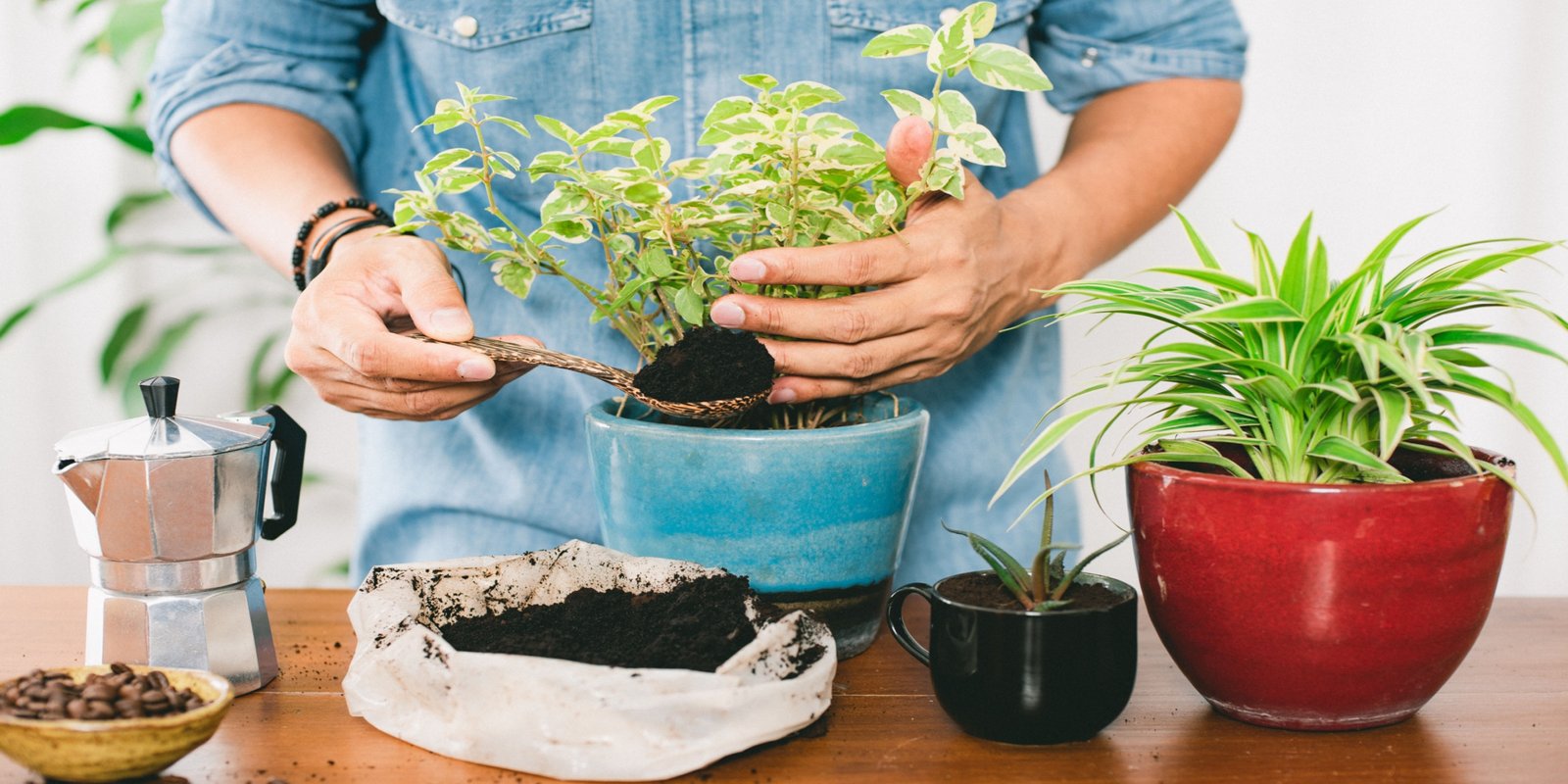No products in the cart.
Ever wondered what happens to the coffee grounds left behind after brewing your morning cup of coffee? Those coffee grounds are often thrown into the bin without a second thought. They are the residue left over after coffee beans are brewed, consisting of the bean’s fibrous and insoluble components. In this blog, we will cover topics such as coffee grounds recycling, what are their uses, and benefits.

What are the benefits of coffee grounds recycling?
Recycling coffee grounds holds significant importance for several reasons, including environmental, economic, and practical benefits. Here’s a breakdown of these:
Environmental Benefits
- Reduction of Waste: Coffee grounds constitute a considerable portion of daily waste. Therefore, recycling them reduces the volume of organic waste sent to landfills. Thus, it helps to decrease the environmental footprint.
- Decreased Methane Emissions: Organic waste decomposing in landfills produces methane, a potent greenhouse gas. By recycling coffee grounds, methane emissions are reduced, contributing to the fight against climate change.
- Soil Enrichment: When used as compost, coffee grounds enrich the soil with essential nutrients such as nitrogen, potassium, and phosphorus. This improves soil quality and promotes healthy plant growth.
Economic Benefits
- Cost Savings: Businesses and households can save on waste disposal costs by recycling coffee grounds. Additionally, using coffee grounds as a fertiliser can reduce the need for chemical fertilisers, offering further savings.
- Resource Utilisation: Coffee grounds can be repurposed in various industries, such as agriculture, cosmetics, and biofuel production, creating new economic opportunities and promoting circular economy practices.
Practical Benefits
- Soil Amendment: Coffee grounds improve soil structure and water retention. They also enhance the aeration of heavy soils, making them more suitable for gardening and farming.
- Pest Control: Coffee grounds can act as a natural pest repellent. They deter slugs, snails, and other garden pests, reducing the need for chemical pesticides.
- Odour Neutralisation: Due to their natural deodorising properties, coffee grounds can be used to neutralise odours in various settings, including refrigerators, shoes, and around the house.
- Energy Production: Coffee grounds can be converted into biofuel. The oil extracted from coffee grounds can be used to produce biodiesel, and the remaining biomass can be used to generate electricity or heat. This contributes to sustainable energy solutions and reduces reliance on fossil fuels.
Coffee Grounds Recycling: Collecting and Storing Coffee Grounds
Collecting coffee grounds at home is simple. After brewing your coffee, let the grounds cool and then store them in an airtight container. Thus, you can use them fresh or dry them for future use.
For cafes and restaurants, setting up a collection system for coffee grounds can be a bit more involved. It usually involves training staff to separate grounds from other waste and providing dedicated bins for collection. Moreover, partnering with local farmers or gardeners can ensure the grounds are put to good use.
Proper storage of coffee grounds is important to prevent mould and odour. Whether at home or in a commercial setting, keeping the grounds in a cool and dry place is a must. Moreover, airtight containers or compostable bags work best for storing the coffee grounds.
Creative Uses for Recycled Coffee Grounds
After brewing, these coffee grounds hold a surprising amount of potential for a variety of creative uses around your home and garden. Some of them include:
Beauty Treatments
- Exfoliating Scrub: Coffee grounds are a natural exfoliant, making them perfect for creating a DIY face and body scrub. Mixing used grounds with coconut oil, honey, or yoghurt for an invigorating and skin-softening treatment.
- Hair Care Boost: Coffee grounds can add a touch of shine and richness to dark hair. Simply add a tablespoon of grounds to your regular conditioner for a natural colour boost.
Household Uses
- Natural Deodoriser: Coffee grounds are brilliant at absorbing unwanted odours. They can be used to freshen up carpets or covers by sprinkling, letting them sit for a while, and then vacuuming thoroughly.
- Cleaning: The gritty texture of coffee grounds makes them a great natural cleaning agent. Use them to scrub pots and pans, clean your fireplace, or even polish wood furniture.
Gardening Purposes
- Pest Repellent: Certain insects find the smell of coffee grounds unpleasant. Scatter dried grounds around your plants to deter slugs, snails, and even some crawling insects.
- Composting: Coffee grounds are a fantastic addition to your compost pile. They add nitrogen, a key nutrient for plant growth, and help improve drainage and aeration in the compost.
Additional Uses
The creative uses for coffee grounds extend far beyond this list! You can explore using them for:
- Art projects: The natural brown tones of coffee grounds can be used for dyeing fabrics, creating unique textures in artwork, or even for coffee ground painting.
- Candle making: Add a touch of coffee aroma to your homemade candles by incorporating dried grounds into the wax.
- Grilling and BBQ: Coffee grounds can be used as a rub on meat for added depth of flavour.
Conclusion
Recycling coffee grounds is a simple yet effective way to reduce waste and promote sustainability. From improving your garden to creating natural beauty products, the possibilities are endless. Moreover, by adopting coffee grounds recycling in our daily lives, we can make a positive impact on the environment and contribute to a more sustainable future.
Furthermore, you can visit the Wise Campus and enrol in our Barista & Coffee Making course for learning more valuable insights about this popular industry. Also, our courses are CPD-certified, allowing you to practice your profession anywhere in the UK.






